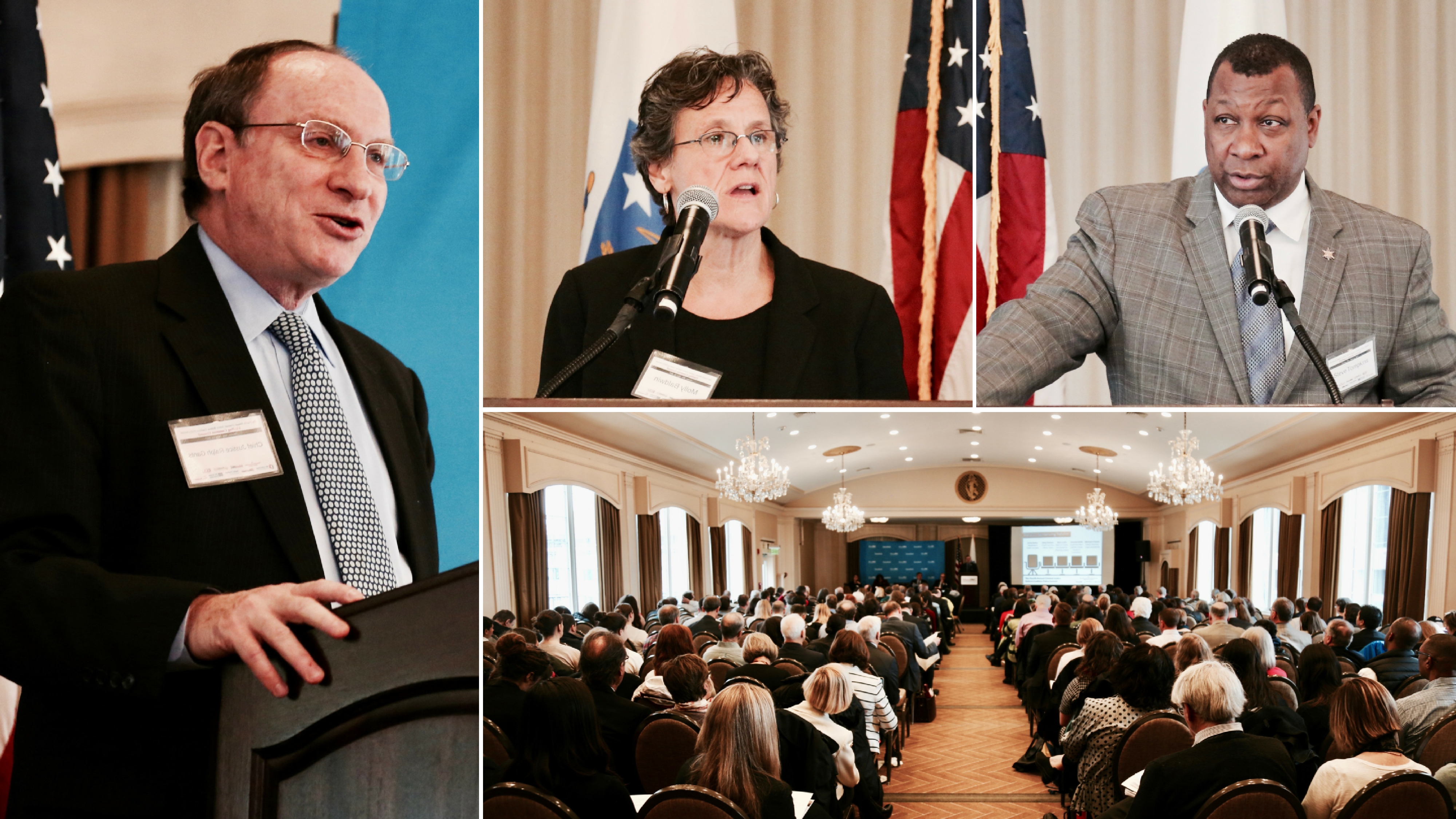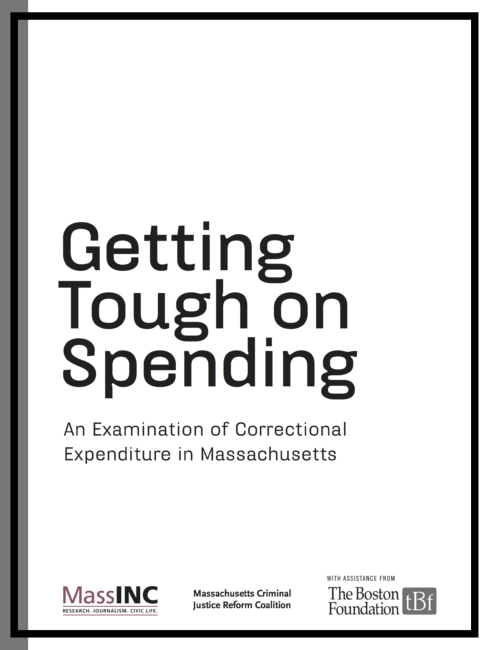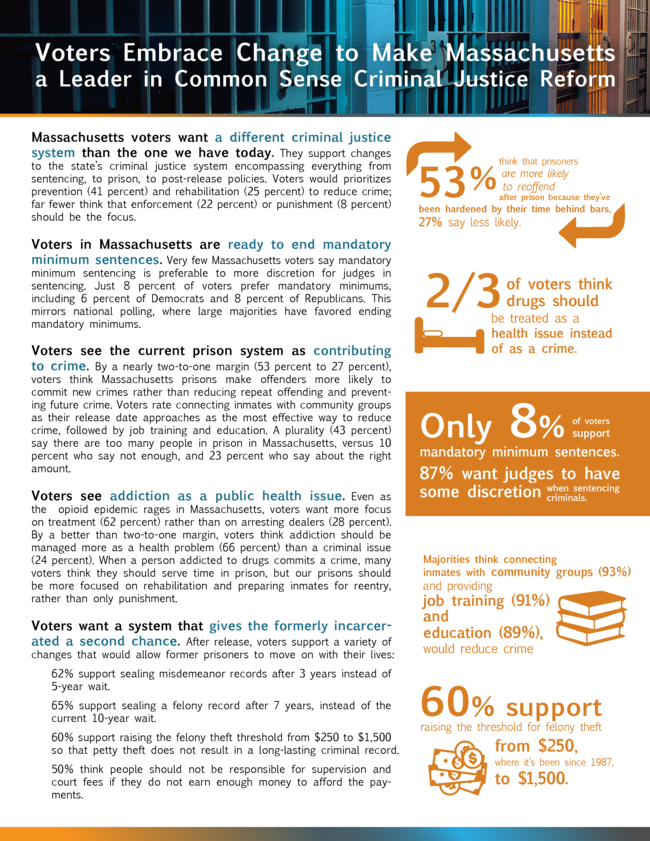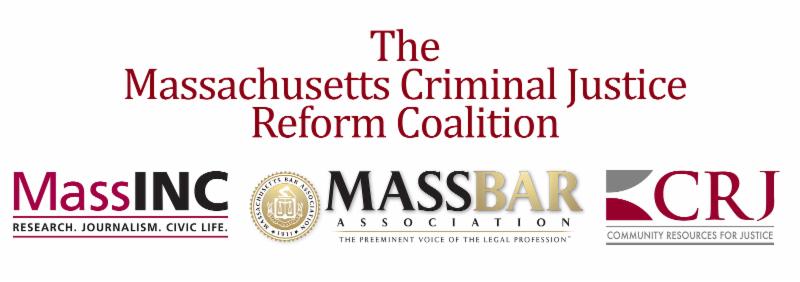
Finding Common Ground

The Fourth Annual Criminal Justice Reform Coalition Policy Summit brought together over 300 leaders on Monday morning at the Omni Parker House in Boston. The program, entitled Finding Common Ground, featured a two-part conversation on reform and reinvestment, presentations of new polling (slides) and research, and remarks from a diverse group of thought leaders.
Representative Katherine Clark opened the program with a reminder that members of both parties in Congress support criminal justice reform, “We agree that there is an economic and a moral cost to having the largest prison population in the world,” she said, stressing the importance of working in a bipartisan way to address the problem. The remainder of the summit echoed that sentiment, with a diverse cross-section of leaders discussing and debating the ways in which we achieve reform and improve outcomes for all residents in Massachusetts.
A video message from former Governor Bill Weld and findings from MassINC’s latest poll were presented, followed by the first panel conversation on sentencing reform and other legislative changes that should be on the table this session.
Chief Justice Gants followed with an address imploring us to think of one another as teammates (download the speech). If our success is dependent on the success of every other resident in Massachusetts, we should take very seriously our task of creating a criminal justice system that helps every person “get past their past and to move on to a more productive future.”

The conversation continued with a video from Grover Norquist, encouraging Massachusetts leaders to take a hard look at how we spend resources within the corrections system. Mike Widmer and Ben Forman presented analysis and offered four recommendations, based on their new report on recent correctional expenditure patterns (download the research presentation). Responding to these research findings, our second panel discussed a number of effective programs that could scale up if we can allocate resources elsewhere within the corrections system.
Getting there will require concerted effort. As Greg Torres pointed out in closing remarks and Massachusetts Criminal Justice Reform Coalition co-chair Wayne Budd underscored in a video message, it has taken 30 years to revisit the failed policies that were once hailed as bipartisan solutions to crime.
Thank you to everyone who was able to attend the event. A special thank you is due to our Coalition co-chairs, members, sponsors, elected officials, and participants in the program. Please share the research and event videos, and we hope that you remain engaged in this process.

Videos from the Summit
In the News
Aim prison budgets at rehabilitation
THERE IS A LOT of talk in Massachusetts about moving away from the misguided “tough-on-crime” policies of the 1990s and instead embracing a more rehabilitative approach to criminal justice. But as an important  new study set for release Monday demonstrates, policy makers aren’t living up to the second part of the bargain.
new study set for release Monday demonstrates, policy makers aren’t living up to the second part of the bargain.
The report, from the MassINC think tank, shows that even as the state’s average daily prison population declined by 12 percent over the last five years, corrections spending soared by 18 percent. Read More…
State prison spending soars despite falling population
Spending for the Department of Correction and the 14 county sheriffs’ offices outpaced inflation and rose 18 percent from 2011 to 2016, reaching $1.2 billion, according to the report by the Massachusetts Institute for a New Commonwealth, or MassINC, a nonpartisan think tank. Read more…
Report: Massachusetts spending more on corrections, despite  declining prison population
declining prison population
The MassINC think tank, in a new report, criticized state government for increasing spending oncorrections even as the inmate population has declined.
The report found that most of the spending has been on hiring staff and raising salaries, not on programming to benefit inmates and reduce recidivism. Read More…
Mass. Spending On Incarceration Is Up 18 Percent,Though The Inmate Population Is  Down 12 Percent
Down 12 Percent
The report comes from the nonpartisan think tank MassINC, which advocates for criminal justice reform measures.
Its authors write that, over the five years, spending “associated with recidivism reduction did not increase significantly, and these services continue to represent a small fraction of total correctional expenditure.”
“The savings if we’d held the spending growth to inflation would have been $72 million,” co-author Michael Widmer, former president of the Massachusetts Taxpayers Foundation, told WBUR’s Newscast Unit. “That $72 million could be used dearly elsewhere, including on programs to reduce recidivism.” Read more…
Report: Inmate levels down but spending keeps rising
THE NUMBER OF INMATES in the state’s prisons and jails is going down, but the cost of operating those facilities is going up, largely because correctional institutions are adding more employees and paying their existing workers more, according to a study by MassINC.
SJC Chief Gants And U.S. Rep. Clark Say End Mandatory Minimum Sentences
As the Trump administration revives a tough-on-crime strategy, Beacon Hill continues its debate on  rethinking how best to treat those convicted of crimes. That debate has put the spotlight on the usually subdued leader of the judicial branch, Supreme Judicial Court Chief Justice Ralph Gants.
rethinking how best to treat those convicted of crimes. That debate has put the spotlight on the usually subdued leader of the judicial branch, Supreme Judicial Court Chief Justice Ralph Gants.
Gants renewed his call for the end of mandatory minimum sentences Monday, saying the cost of incarcerating so many members of society is untenable for the Commonwealth.
“Mandatory minimum sentencing is a failed experiment that must end. And it must end for all crimes, except the crimes of murder and repeated OUI offenses, not just for drug crimes,” Gants said at a criminal justice summit hosted by MassINC. Read more…
Read the latest research from the Massachusetts Criminal Justice Reform Coalition
Getting Tough on Spending: An Examination of Correctional Expenditure in Massachusetts
An Examination of Correctional Expenditure in Massachusetts
While past research from MassINC, the Boston Foundation, and others had revealed substantial problems and numerous commissions had convened to find solutions, there was no sense of urgency, and progress had been incremental at best. The coalition’s first undertaking was to capture this history and the nagging inefficiencies in their framing report, Crime, Cost, and Consequences, released in March 2013. This first report paid particular heed to the state’s fiscal challenges and the increasing tendency of the corrections system to crowd out other vital public investment.
We submit this fresh examination of correctional budget trends as legislative leaders sort through a bevy of criminal justice reform proposals, including findings and policy recommendations from the Justice Reinvestment Initiative. The most detailed report on correctional expenditure in Massachusetts to date, Getting Tough on Spending raises fundamental questions around how Massachusetts makes the state budget guiding policy for criminal justice reform. From providing treatment alternatives to incarceration for those struggling with mental illness and addiction, to reducing recidivism among those who commit violent crimes, all paths lead through the budget. Read the report
New public opinion poll from The MassINC Polling Group
 Massachusetts voters ready for major changes to state criminal justice system
Massachusetts voters ready for major changes to state criminal justice system
Massachusetts voters strongly favor judicial discretion over mandatory minimum sentencing and broadly support more aggressive reforms to the criminal justice system than are now being considered by legislators, a new MassINC poll shows.
“Massachusetts voters across the political spectrum see the need for major change to the criminal justice system,” said Steve Koczela, president of the MassINC Polling Group, which conducted the poll. “This poll finds strong support for a range of reforms among Republicans, Democrats, and independents.”
By a nearly two-to-one margin (53 percent to 27 percent), voters think Massachusetts prisons currently do more harm than good, making inmates more likely to commit new crimes rather than preventing future crime. A plurality (42 percent) think there are too many people in prison in Massachusetts, while 23 percent say the number is appropriate. Just 10 percent say there are not enough. Learn More


